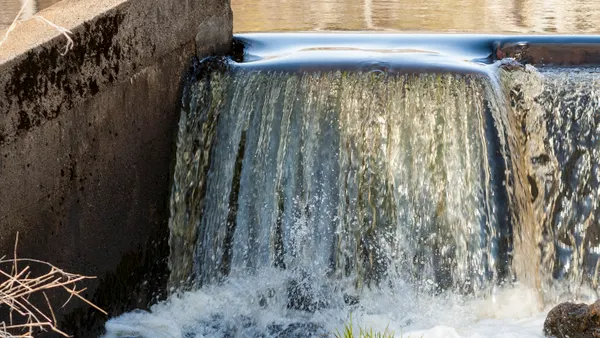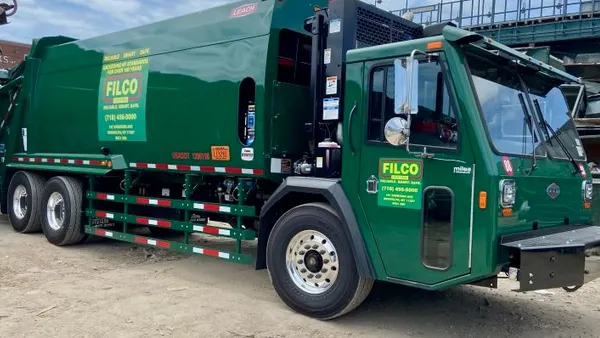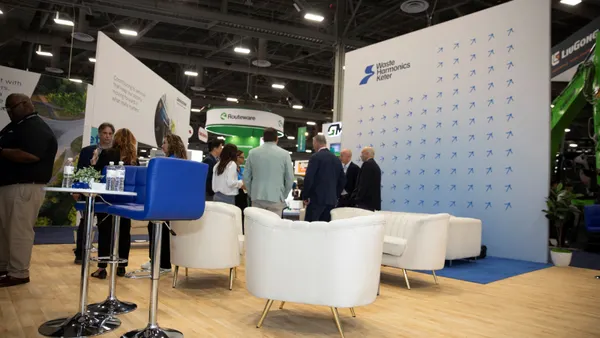Dive Brief:
- The End of Waste Foundation (EOW), a California-based startup, is set to launch a software platform with blockchain technology that will track material from haulers to MRFs to processors to manufacturers. This will result in a certificate verifying tonnage, path to recycling and greenhouse gas emissions offset once the loop is complete.
- Valued at $70 per ton, certificates can be purchased or partially funded by generators and others in the value chain. Up to $35 per ton will get shared among each entity involved – from haulers to manufacturers. A minimum of $20 will be dedicated to R&D. The remainder stays with EOW as a management fee.
- EOW's first official industry partner is Colorado-based Momentum Recycling. Paul Dolan Vineyards and others have also signed on. The foundation projects it can help achieve a 75% glass container recycling rate in the U.S. by 2030 if the concept is successful.
Dive Insight:
Glass was seen as an obvious first choice given a mounting narrative that the material isn't worth recycling in many parts of the U.S. due to a lack of regional end markets. Still, more than doubling the current glass container recycling rate of 33% within the next decade will require significant buy-in. EOW has been working the conference circuit and pitching its concept far and wide to help make that happen.
The startup says it can tap into a current sense of unaccountability and frustration in the current recycling system by offering this new path. Some would point to extended producer responsibility (EPR) as the logical answer, but the U.S. recycling industry and many manufacturers have traditionally opposed such regulations. EOW's "distributed shared responsibility" model aims to solve that by spreading accountability across the entire lifecycle of a product – from creation to consumption to recycling.
“In the system the producer is not alone, and should not be alone," CEO Ionut Georgescu told Waste Dive in a recent interview. “The system is not two-dimensional. It's multi-dimensional.”
Georgescu speaks from experience, having spent multiple years as the director of waste management for Romania's Ministry of Environment and working closely with EPR systems.
The lack of accountability in U.S. recycling today, including what happens to material once it enters a MRF, is seen as a key issue holding back further growth. Additional reporting can help begin to solve this, but new funding for education and infrastructure to keep more material from going to disposal is seen as an even bigger solution. That could include non-curbside collection models in order to capture material more cost-effectively.
“For me diversion from landfill is not export to another landfill, it’s about reusing the materials and really creating a circular economy," said Georgescu, calling his system "100% transparent."
While companies such as Momentum have found successful models for glass recycling in areas with nearby bottle manufacturers, or other end markets, the material's weight and processing logistics make recycling less likely when buyers aren't within a reasonable distance. This has led municipalities in many parts of the country to cut glass from their curbside programs at the behest of haulers and MRF operators – especially as overall recycling costs rise due to market issues for other commodities.
Last month, a Glass Recycling Foundation was launched by nearly 40 stakeholders with the goal of stabilizing glass markets and proving successful concepts in targeted markets. How EOW will fit into those efforts, or the industry at large, remains to be seen. Georgescu is highly optimistic that his company's offer to subsidize glass recycling, paired with the increasingly urgent climate crisis, will make the concept too hard to ignore. After glass, EOW aims to tackle plastic and food waste as soon as next year.









